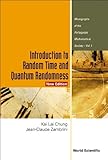Introduction to random time and quantum randomness / Kai Lai Chung, Jean-Claude Zambrini.
Material type: TextSeries: Monographs of the Portuguese Mathematical Society ; v. 1.Publication details: River Edge, N.J. : World Scientific, 2003.Edition: New edDescription: 1 online resource (xii, 211 pages)Content type:
TextSeries: Monographs of the Portuguese Mathematical Society ; v. 1.Publication details: River Edge, N.J. : World Scientific, 2003.Edition: New edDescription: 1 online resource (xii, 211 pages)Content type: - text
- computer
- online resource
- 9789812795175
- 9812795170
- Quantum chaos
- Random fields
- Mathematical physics
- Stochastic processes
- Stochastic Processes
- Chaos quantique
- Champs aléatoires
- Physique mathématique
- Processus stochastiques
- SCIENCE -- Physics -- Quantum Theory
- Mathematical physics
- Quantum chaos
- Random fields
- Stochastic processes
- Random walks (statistiek)
- Kwantummechanica
- Stochastische processen
- Processos estocasticos (aplicações)
- Física
- Mecânica quântica
- 530.12 22
- QC174.17.C45 I62 2003eb
| Item type | Home library | Collection | Call number | Materials specified | Status | Date due | Barcode | |
|---|---|---|---|---|---|---|---|---|
 Electronic-Books
Electronic-Books
|
OPJGU Sonepat- Campus | E-Books EBSCO | Available |
Includes bibliographical references and index.
Print version record.
Foreword to part 1 -- pt. 1. Introduction to random time. 1. Prologue -- 2. Stopping time -- 3. Martingale stopped -- 4. Random past and future -- 5. Other times -- 6. From first to last -- 7. Gapless time -- 8. Markov chain in continuum time -- 9. The trouble with the infinite -- Foreword to part 2 -- pt. 2. Introduction to quantum randomness. 1. Classical prologue -- 2. Standard quantum mechanics -- 3. Probabilities in standard quantum mechanics -- 4. Feynman's approach to quantum probabilities. 4.1. Lagrangian mechanics. 4.2 Feynman's space-time reinterpretation of quantum mechanics -- 5. Schrödinger's Euclidean quantum mechanics. 5.1. A probabilistic interpretation of Feynman's approach. 5.2. Feynman's results revisited -- 6. Beyond Feynman's approach. 6.1. More quantum symmetries. 6.2. Introduction to functional calculus -- 7. Time for a dialogue.
This book is made up of two essays on the role of time in probability and quantum physics. In the first one, K.L. Chung explains why, in his view, probability theory starts where random time appears. This idea is illustrated in various probability schemes and the deep impact of those random times on the theory of the stochastic process is shown. In the second essay J.-C. Zambrini shows why quantum physics is not a regular probabilistic theory, but also why stochastic analysis provides new tools for analyzing further the meaning of Feynman's path integral approach and a number of foundational issues of quantum physics far beyond what is generally considered. The role of the time parameter, in this theory, is critically re-examined and a fresh way to approach the long-standing problem of the quantum time observable is suggested.
eBooks on EBSCOhost EBSCO eBook Subscription Academic Collection - Worldwide
There are no comments on this title.

